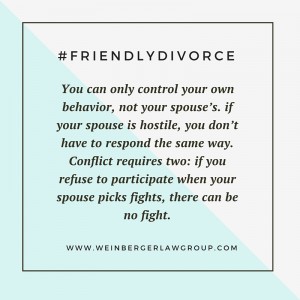3 Tips For Getting An Amicable Divorce
 Nightmare divorces make great fodder for headlines, but the truth is, not every divorce turns into The War Of The Roses. The stories that send shivers up your spine generally involve one or both people with mental health and/or significant substance abuse issues. With practice and foresight, couples that don’t face those challenges can take the following steps to keep their divorce as amicable and collaborative as possible.
Nightmare divorces make great fodder for headlines, but the truth is, not every divorce turns into The War Of The Roses. The stories that send shivers up your spine generally involve one or both people with mental health and/or significant substance abuse issues. With practice and foresight, couples that don’t face those challenges can take the following steps to keep their divorce as amicable and collaborative as possible.
- Mediate. Although litigation is sometimes unavoidable, be forewarned that it is by nature adversarial. In order to “win,” both parties say terrible – and sometimes false — things about each other on paper and in the courthouse. After your bank account is drained and your mental health is compromised, you may even find you are worse off than if you’d settled out of court. And the devastation caused by litigation makes it difficult to get on with your life. By contrast, mediation is quicker, easier on your wallet, and a gentler process. While you may not end up friends, you are far more likely to remain civil – a huge plus if you will be co-parenting in the years to come.
- Avoid custody battles. One of the worst byproducts of divorce, a child custody battle turns co-parents into mud-slinging foes and puts kids in the crossfire. As profound as the psychological toll is on adults, it is even worse on children, who are often pressured to take sides in a no-win scenario. In some cases, custody battles lead to parental alienation that can sever or damage a parent-child relationship forever — and set the adult child up for a lifetime of conflictual relationships. Except in extreme situations, when someone is mentally ill or has some other legitimate problem that prohibits them from appropriate parenting, you should do everything in your power to avoid a custody battle.
- Sweep your own side of the street. This slogan, popular in 12-step programs, also applies to divorce. Many people try to deflect the shame they feel over a failed marriage by blaming the other person for just about everything: the problems in the marriage; the divorce; any issues the kids have; and in general, their own unhappiness. The inability to look at one’s shortcomings fosters immature behavior: public bad-mouthing; telling your children you think their other parent is a jerk; and ineffective, hostile communication with your ex. The next time you find yourself talking to yourself, or anyone else, about the myriad of things that you believe are wrong with your former spouse, shift that myopic focus to yourself. What did you do that led to the divorce? What do you do that creates conflict for your kids? Which of your own behaviors do you need to change? And what can you do to make yourself a better person? Therapy? Meditation? Medication? A creative endeavor? You cannot “fix” another person, but if you fix yourself, you will likely change the dynamic with your ex, which might invite a more positive response.
Getting an amicable or collaborative divorce isn’t necessarily easy. But with perseverance and discipline, you can develop the skills necessary to manage your emotions, communicate like an adult, and focus on what is best for your children (rarely does this involve removing the other parent from their lives). Your life goal should not be punishing your ex. You want to end up on your deathbed with dignity and memories of a life well-lived, no matter what the challenges!
Have questions about your divorce? Our attorneys are here to help. Please contact us to schedule your initial consultation.


